The Co-op Retail Conference, organised by Co-operatives UK, brings together leaders, managers and directors from the UK’s leading co-operative retail societies.
Alongside retail insight analysis from IGD’s Dan Gillett and a passionate plea for greater co-operation by the Co-op Group’s CEO, Shirine Houry-Haq, delegates explored how co-operative ways of working could give retailers in the movement an edge when facing challenges.
These challenges aren’t new, but they aren’t going away, particularly as traditional retailers are also speaking to shoppers’ concerns over affordability, availability and ethics.
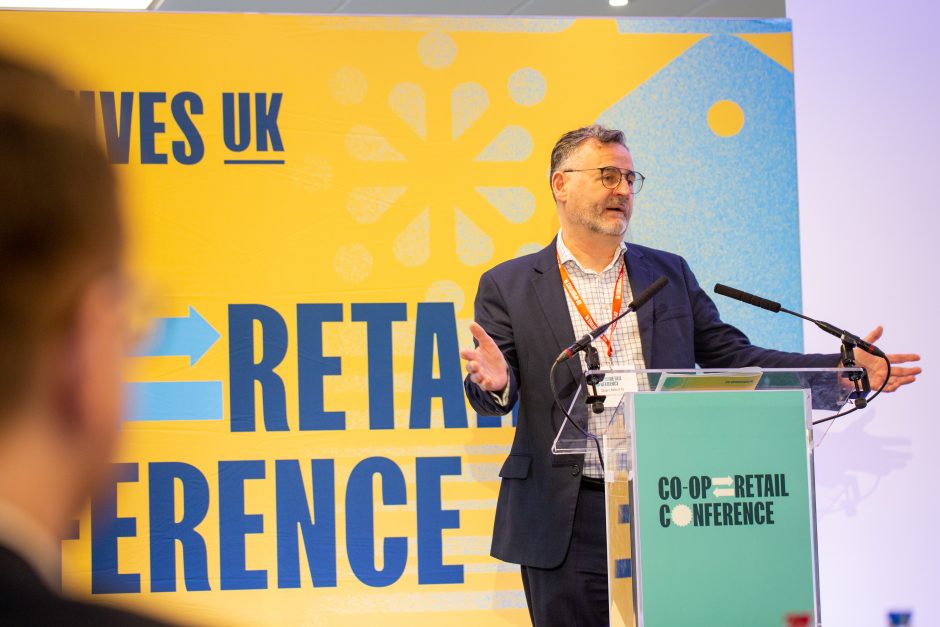
How to avoid greenwashing?
In a panel looking at how co-ops can maintain an ethical position in a cluttered market, Co-op Group Food managing director Matt Hood described the ways ethics show up in convenience retail. “They encourage sustainability, as when you have small shops, people more more likely to walk or cycle, using less fuel – and the concept of buying ‘little and often’ helps food waste. We also have a lot of shops in the heart of communities – by being there we know what matters for them.”
The problem, he said, is how to communicate this ethical difference. “We have lost our way in terms of how we communicate our USP – our membership, our ownership and our co-op difference. It’s criminal we don’t take advantage in selling that USP.” Hood added that the majority of new members joining the Group are under 30. “They know this stuff matters. We have to do a better job of telling people why it matters.”
Alison Hands, incoming CEO of Lincolnshire Co-op, has had a long and varied career, and in previous roles, saw how traditional retailers “think they are ethical and have their own clear vision […] but even if they were originally set up as ethical businesses, many lose the heart of what they were set up to do”.
“For example, Marks & Spencer was originally about its team members being looked after from a health and social welfare perspective. Boots was about bringing healthcare to the masses. And the Body Shop’s Anita Roddick was the modern driver of activism, beginning with refillable toiletries in her store in Brighton.”
She noted how all three lost sight of what they were set up to do. Boots was taken over in a large private equity deal; the Body Shop is now owned by L’Oréal; and M&S focuses on profit.
Doug Field, CEO of East of England Co-op, described the importance of “doing the right thing even when no one is watching […] but you need a balance on a daily basis. You want to use profit to do good, but to do that we need to make a profit“.
Hood agreed: “There are times when we’ve fallen into the trap of thinking ‘commerciality’ is a dirty word. But it’s commerciality that lets you do more of what your USP is.”
Using the tools we have
One visual USP available to the co-op movement is the Coop Marque, launched by the International Cooperative Alliance (ICA) in 2013, which co-ops can use within or alongside their brand identity.
Sheree Hatton from Suma – Europe’s largest single-pay employer, and the largest worker-owned co-op in the UK – explained the practical difficulties of finding spaces on products for non-essential labels, such as the marque. Of the 7,000 ethical products it sells, 1,500 are Suma own-brand.
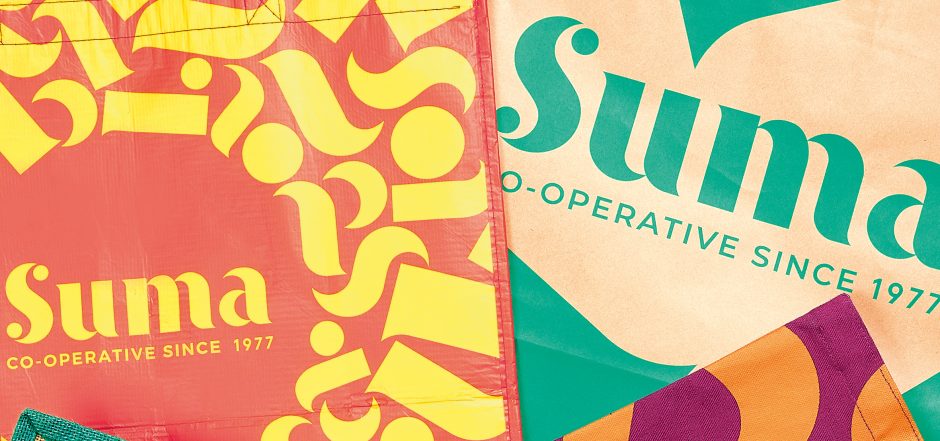
“In our recent rebranding process, we looked at reprioritising co-op messaging, and the designers highlighted that we don’t actually shout about the fact we’re a co-op as much as we think do,” she said. “We looked at how to put the Coop Marque on our products but couldn’t fit them on all items.”
Suma began to use the marque on all its marketing content and email footers and is now looking at rolling it out on products and ingredients which are supplied by other co-ops, including an Italian pasta co-op, coffee co-ops and jackfruit producers.
Speaking as CEO of Radstock Co-op, Don Morris described how his society worked with Dot Coop to change its web domain from .co.uk to .coop.
“We found that we would be eligible to use the Coop Marque, and incorporated that in our store relaunch in Coleford. It’s been really popular with members, colleagues and customers. It’s a small co-op in a small village, but it’s part of an international movement. And the use of the Marque brings those two things together.”
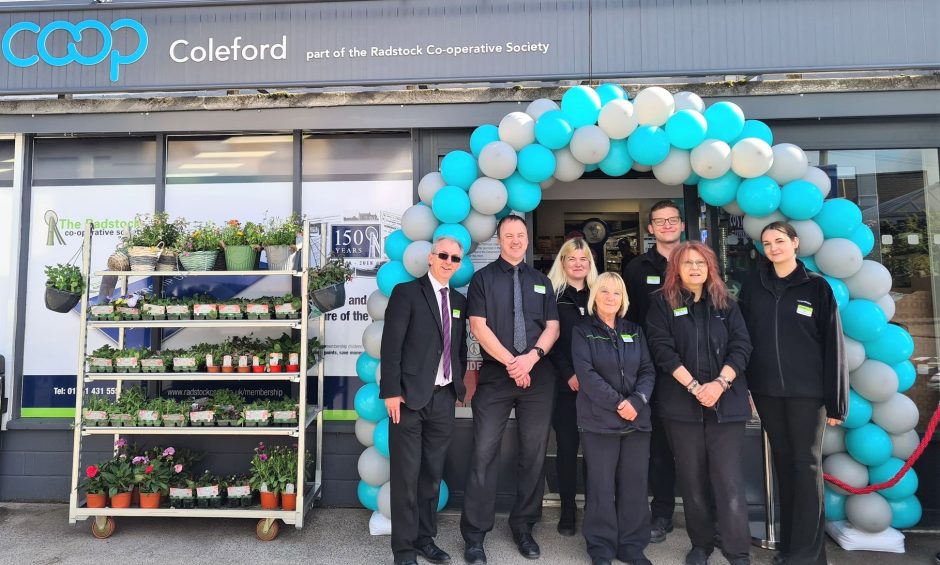
Radstock is now also looking to include the branding on milk supplied by the society’s Manor Farm. “‘We are a co-op, owned by our members’ is a really important statement for us,” said Morris.
In a recorded message, Rob Harrison from Ethical Consumer talked about how labels – such as the Fairtrade mark – are collaborations between consumers, campaigners and businesses “to fix particular issues around us and bring about social or environmental change”.
“Labels enable businesses who are doing something different to differentiate themselves in some way. And they allow customers to participate in making the world a better place,” he said.
B Corp accreditation is a hugely successful example of this. “What they are doing is speaking very much to the moment that we’re in now … There is a sense that co-ops could be in this space, but they need to be bolder about the political differences that you get from co-operation, and how those differences can generate a more sustainable and socially just world.”
Redefining membership
At Midcounties Co-op, chief marketing officer Alison Bain and head of marketing technology Parm Kali-rai have led a digital transformation to redefine membership. “The challenge we had was very static member engagement,” said Kali-rai. “We needed to make sure people understood what membership was, and create a dynamic approach to talk to members about the right things through the right channels.”
Bain highlighted how consumers are increasingly eco-conscious, looking for frictionless living and exploring immersive experience. “In the short and medium term they are cost-constrained and shopping differently” she said. “This means their expectations are changing, expecting brands to be more ethical and helping them to be more ethical – and being rewarded for their custom. […] We looked at all aspects of membership – the rewards, the personalisation and that sense of belonging – and how we could bring it together in an effortless digital service to make members lives easier.”
The project is ongoing, but already the benefits are clear. Alongside a new app, Midcounties replaced siloed legacy systems with a single CRM calendar, and through digital communications has saved 24 tonnes of paper over the first 18 months. During this time, the society attracted 123,000 new members; 140,000 members are using the app. “What really helped is establishing a ‘member-first’ mindset,” said Kali-rai.
Coop Denmark has faced similar challenges: changing consumer behaviours, decreasing value of traditional media, infrastructure legacy systems requiring innovation and a decrease in footfall because people are eating out more.
Anders Mittag at chief commercial officer Lobyco A/S, part of Coop Denmark, described how the digital team moved into a digital development centre, and bought a fintech company with a cloud-based digital platform. “Then we designed the programme, with an aim to increase store traffic increase basket spend, creating longterm member loyalty, more app traffic and increased consumer engagement.”
They launched the new digital loyalty platform in 2016. “Nearly 50% of the population has downloaded the app and it has a better rating than competitors. It has more than a half a million weekly active users: 11-16% of the Danish population.”
The results are impressive, but there was frustration among delegates about duplication, and the cumulative costs of each society spending time and money rather than collaborating on technology. And there were cautions around extracting value from members’ data, and ensuring digital innovations don’t exclude members.
“That’s the challenge,” Bain added. “How do you design membership for the future without leaving others behind? It shouldn’t be preferential – it has to be inclusive for everyone.”
The truth about youth
Inclusivity – and the lack of it – was also addressed in a panel on youth engagement. “There is a disengagement between young people and co-operatives,” said Daniel Cox from the Co-op College. “It’s not like there’s a shortage of young people, it’s a case of no targeted, consistent outreach to bring them into the movement.”
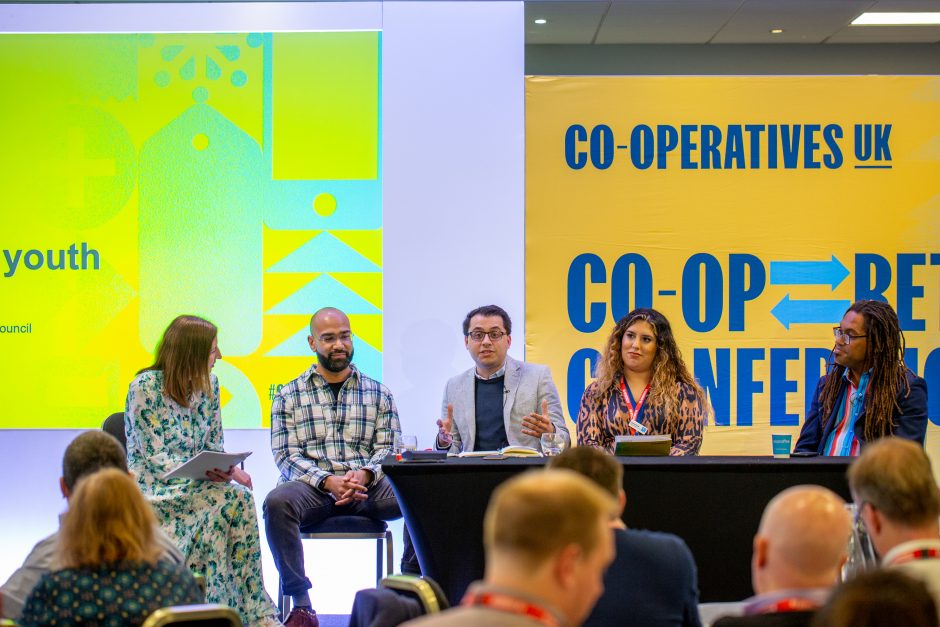
At the College, Cox introduces the concept of co-ops through the Youth Co-operative Action and Co-operative (Ad)Venture projects. For him, there are four Cs that are critical to youth engagement: courage, commitment, connection and consistency. “One-off projects and pilots are fine,” he said, “but if it’s not going to last then it won’t have real impact. You need to be consistent, and you need to establish a real connection.”
He acknowledged there are a lot of disillusioned and disengaged young people. “But many are highly active and trying to disrupt positively,” he said. “To find those people you have to go to their places and spaces and then speak their language. Ask what they’re passionate about and what issues they see in their area. Then you can start to teach co-op skills, values and principles to channel their energy into creating meaningful change and social action.”
Cox believes schools are one of the low-hanging fruits for the co-op movement along with business schools and universities. “There has never been more need for young people to convene and unite, but language is still a big barrier,” he added.
Aysha Khalid, a lead operations officer at the Co-op Group who sits on its National Members Council (NMC), agreed. “Language and perception are big issues,” she said. “To young people, co-ops are confusing, traditional, inaccessible, and not appealing to diverse backgrounds. It doesn’t appear inclusive and young people don’t feel welcomed.”
Her advice was to be more simple and more relevant. “Don’t expect young people to come to you – you need to go to them. Be more open, talk about relevant things inclusive and be mindful of their language.”
She highlighted how the Group is working with young members, is providing affordable meal deals at music festivals, and has recently launched a charity partnership with Barnardo’s, and gave the example of how a change in marketing language at a Birmingham store, aimed at students, radically increased engagement. “At last year’s Co-op Youth Summit [organised by Co-ops UK in July] the language was also accessible,” she said, highlighting how the marketing for the event started with what co-ops could do for youth – such as create ethical jobs and housing solutions – rather than what co-ops are.
NMC vice-president Jeevan Jones spoke about the differences between a young person who is 18 and one who is 28; but what they share are specific interests that guide and inspire them and “a distrust in institutions to solve issues they see. They start asking ‘how will I solve this? And self-help is an explicit co-op value.”
Jones found co-ops through studying economics at Birmingham University, thinking “that there had to be something more,” and seeking out co-operative businesses in the city. “That’s not the route for everyone,” he said, adding that “the problem with being the youngest person in the room is that you get mobbed and asked to stand for everything. The co-op movement needs to have a serious conversation with itself about what the future holds, and take into account things important to young people, such as remote working, technology and AI.”
Artificial Intelligence is having a massive impact on employment, what roles look like, and recruitment processes, as the power of tools such as Chat GPT are being realised – and this is adding to the pressure young people feel about what to do next, said Dan Sodergren from Greater Marketing Works.
“If AI takes the jobs it might take there will be a lag in the system, and space for people to think about the jobs they want. Only 9% of working people engaged with the work they do, and 50% of people want to work in an ethical place.”
Using AI doesn’t have to be expensive, and should be embraced as a tool to use, like websites and social media were, Sodergren said. “Technology is an enabler. Young people want to be part of an ethical business that uses technology.”
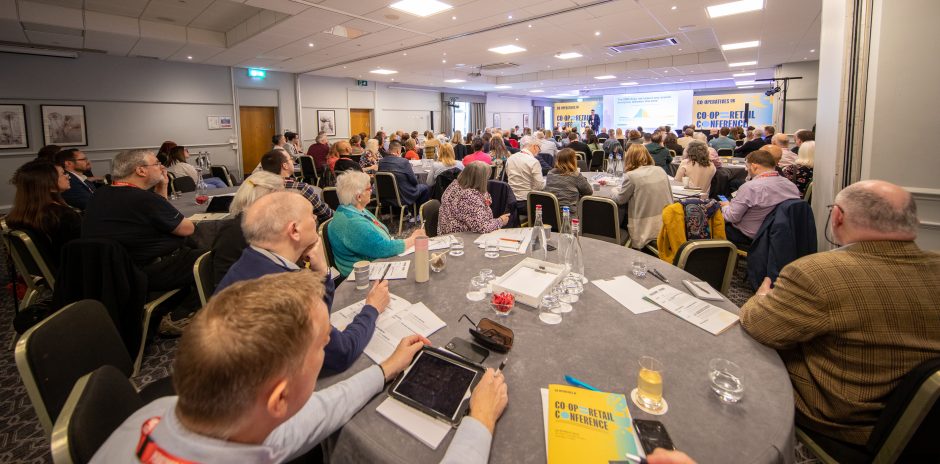
The spirit of co-operation
The ethics and collaborative nature of co-ops were shared in a series of presentations by delegates, highlighting ‘the spirit of co-operation’.
In a pre-recorded video, Central Co-op’s Debbie Robinson described how the society’s stores are designed with members in mind, with spaces to sit, bike repair stations, defibrillators, and male, female and gender-neutral toilets. Robinson also showcased a partnership with Suma to provide refill stations for dry goods, including pet food, and the own-brand ‘Fair and Honest Value’ range. “We are on a cultural journey,” Robinson said, describing how the organisation’s new framework – The Difference Makers – was shaped by input from over 1,000 staff. “We focus on practical co-operation. We are about people in communities coming together to serve people in communities.”
Making a difference is also at the heart of Bright Future Co-op, which works with charities and businesses to provide opportunities of a paid work placement and a job to those who have been rescued from modern slavery. Pete Westall, chief values officer at Midcounties and chair of Bright Future, highlighted how the co-op movement has long been committed to the emancipation movement: the American spelling in the old co-operative wheatsheaf logo – which contained the words ‘Labor and Wait’ – was a nod to the US antislavery movement.
Bright Future was sparked by a conversation between Phill Clayton, head of development at City Hearts charity, and Paul Gerrard, campaigns director at the Co-op Group. That conversation led to the launch of Bright Future in 2017. In 2020, Bright Future was established as a co-op, and now has referrer members, plus 13 business members offering paid employment to survivors of modern slavery.
“In 2015 we all had to comply with the Modern Slavery Act, but we thought we should all do more than signing a statement,” said Westall. “The difference is about enabling to people to regain control of their own lives. If you want to live your modern slavery statement, this is it.”
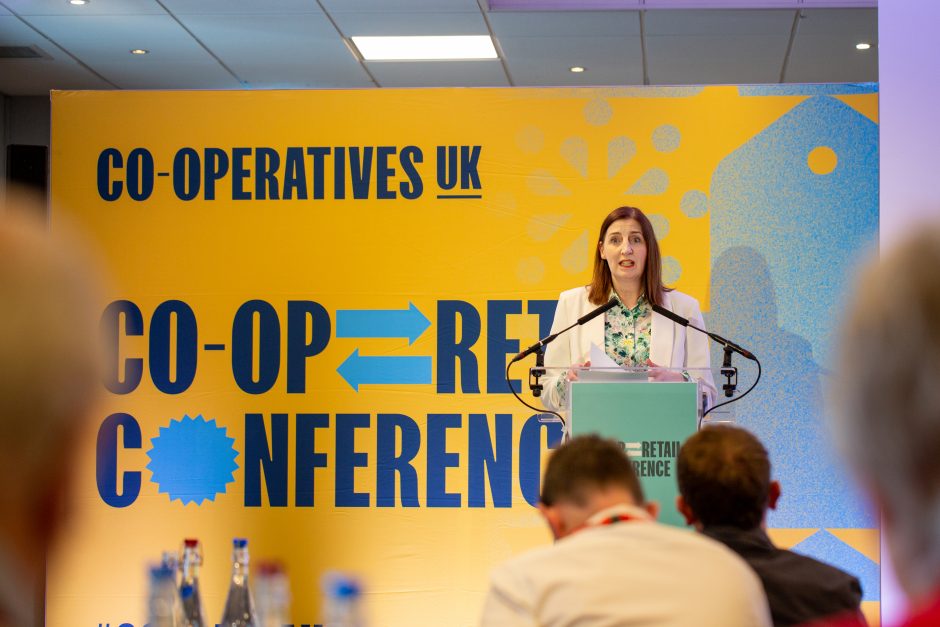
The co-op difference will also inform this year’s Co-operatives Fortnight campaign (19 June – 3 July). “We’re uniting the movement in a way we’ve never done before,” said Co-operatives UK CEO, Rose Marley. “The campaign will focus on the people of different co-ops, suggest collective action and suggest alternative ways of living.”
The theme will be “Altogether different” and will encourage co-ops to share the impact they make, said Marley, adding that the apex body will be crowdfunding a national campaign, in partnership with Reach PLC (formerly Trinity Mirror).
Sarah Pullen, commercial director (regionals) at Reach, described her experience of co-operatives through the setting up of her local village shop, which was bought by the community through community shares and a small mortgage after the original owners left. “The world is changing. I’m proud to be part of it,” she said.
Co-op Party update
Joe Fortune, general secretary of the Co-op Party, gave delegates an update on the campaign issues the Party has been working on. “There’s no one group of campaigns we campaign on, the range is phenomenal,” he said. This range includes community energy, Healthy Start vouchers and, most recently, the Diverse Councils Declaration, “which is about embedding our values and principles in local democracy.”
“All of this is about the Co-op Party integrating with the wider co-op movement on issues that are important to us and to you,” he added. “We helped prevent the demutualisation of LV=, helped pass new legislation protecting retail workers and helped increase the uptake in Healthy Start vouchers.”
Current campaigning priorities for the Party are energy, community power, food justice and modern slavery. And the Party is also calling for co-op growth. “The co-op movement is unique and beautiful and important. All of us think that. But not a single pound currently spent by the state is on co-op development. We’re not growing and we’re not supported to grow.”
The Party wants the number of co-ops to double, and will be calling for development support funding, seed funding machinery of government support, new and updated legislation and new financial instruments,
“We know what the answer is, we just indeed people to support it,” he said.